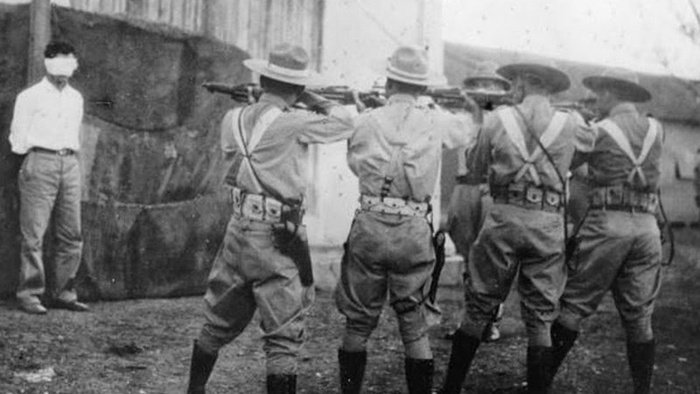For the old generation in Indonesia, the name Henky Tupanwael is one of the people who mostly reported in Indonesia’s newspaper between 1960 – 1980. Henky is familiar with the harsh world of crime in old Indonesia. His courage and the first crime that got him imprisoned was when he killed a military policeman. After that, he was known as a robber and recidivist who was good at escaping before being sentenced to death.
Henky Tupanwael was born in Ende, Flores, August 17, 1932. His father, Jacob Mathias Tupanwael, was a member of the Koninklijk Nederlandsche Indische Lager (KNIL). Little Henky grew up in the harsh world of an army brat. In the colonial era, children of Ambon KNIL were often identified with fierceness. “On August 22, 1944, when (Kusni) Kasdut was still wandering the bus terminal, Henky had already completed a criminal assignment when he shot dead a military policeman with a gun and was arrested, detained, and imprisoned in a juvenile prison in Tangerang, ” wrote Daniel Dhakidae in Menerjang Badai Kekuasaan (2016).
1944 was a difficult year for the ex-KNIL Ambon’s family because of the pressure from the Japanese troops who controlled Indonesia from 1942 to 1945. The Military Police at that time were Japanese military police called Kempeitai who were notorious for being cruel. Anyone who tries to fight the Japanese military, they do not hesitate to kill. Henky would have done something similar to what Supriyadi did in the PETA Blitar Rebellion: killing the Japanese. Later, Supriyadi was declared missing and Henky was only imprisoned.
However, prison did not make Henky’s life any better. Henky’s crimes escalated after that. “In 1957, when he was 25 years old, his crimes began to escalate by robbing the National Economic Bank in Bandung,” wrote Daniel. For his crime, Henky was sentenced to 4 years and 6 months. Like Kusni Kasdut, a contemporary recidivist legend, Henky is also used to escaping from prison. Prisons in the Old Order era had many opportunities to escape, for people like Henky Tupanwael or Kusni Kasdut. Henky escaped in 1963, from Banceuy prison, Bandung. Outside the prison, Henky went crazy. He visited the house of a judge in Bandung on his burglary mission. Then the police chased and arrested him. Henky was sent to Nusakambangan, which is considered the Alcatraz of Indonesia, where no one can escape from the island safely.
Henky should have languished there for 11 years. However, no matter how harsh a prison seems unable to isolate him. Less than a year, he escaped. He swam across Segara Anakan to reach Java. Because crossing the two islands is not easy, Henky’s name has become even more famous and legendary. Henky is one of the few people who can escape from the most terrifying prison in Indonesia.
In Jakarta, after escaping from Nusakambangan, Henky rejoined his friends. He robbed Bank Nusantara, which made him earn more than IDR 21 million. In the action, two people were killed. Henky was later caught but managed to escape again for 13 days. Henky was arrested again in Tanah Abang, Jakarta.
Henky didn’t run away anymore. In 1966, Henky was put on trial. The trial judge named Thamrin Manan judged Henky alone without being accompanied by members of the panel of judges. When brought to the courtroom, the guards who escorted Henky apparently forgot to bring the key to the handcuffs that were restraining Henky’s hands. In fact, Thamrin has the principle that the trial will not proceed with the defendant in handcuffs. For the sake of the smooth running of the trial, Henky also demonstrated his “magic ability”: removing his handcuffs without a key in front of the court.
On that day, the death sentence was handed down for the army brat After the trial, in 1969, Hakim Thamrin resigned from his profession and became a lawyer in Jakarta. Henky was not imprisoned in Nusakambangan again before his execution. He was imprisoned in Pamekasan, Madura, East Java, the prison that allowed Henky to escape. However, he did not run away.
“For my son, escaping from prison is easy,” said priest Jacob Mathias Tupanwael, Henky’s father to Tempo journalists in the early 1980s, in Bandung. At that time, he had just come home to visit Henky. Do not forget Jacob threatened: “If you run away, (from the last prison) the one who will shoot is not the police, but myself, the father.”
In Jacob’s eyes, Henky is an obedient, kind, cheerful, and helpful child. The loot is not eaten alone. Looks like Robin Hood. His father said that he once contributed money to social activities. At home, Henky always obeys his father’s orders, directed full of love by his father, but it’s different if he’s already outside his house, his outside association turned Henky into a bad person,” said Jacob, “my weakness, as a father, is that I don’t know who he hangs out with.” Prior to his death sentence, according to his father, Henky had repented for a dozen years. Before his execution, Henky said this to the prison officials: “If one reaches heaven by virtue, let me attain by means of evil.”
Finally, Henky appeared before his firing squad on January 5, 1980. He was picked up from his cell at four in the morning. In a shirt with the wrong buttons on and on flip-flops, Henky’s stocky body is tied to a pole, his eyes blindfolded by a red cloth. His body collapsed on the ground on Moringa’s leaves after being hit by bullets from the firing squad.
Adapted from “Henky Tupanwael, Anak Kolong yang Terjerumus Jadi Garong”, https://tirto.id/ceBU
Reporter: Petrik Matanasi Writer: Petrik Matanasi Editor: Maulida Sri Handayani
